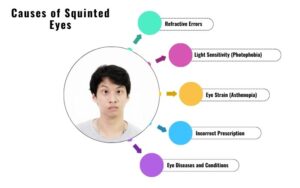Squinted eyes are a common condition that many individuals experience from time to time. Whether it’s due to bright light, fatigue, or vision issues, squinting can be more than just an occasional inconvenience. In some cases, squinted eyes may be a sign of an underlying issue that requires attention. If you’re struggling with squinty eyes, understanding the causes and seeking the right squinty eyes treatment is crucial for restoring clear vision. In this blog post, we’ll dive into everything you need to know about squinted eyes treatment, so you can see clearly again.
What Are Squinted Eyes?
Squinting occurs when the eyes are narrowed, typically due to light sensitivity, focusing issues, or an attempt to see something more clearly. It’s a natural reaction to bright lights, glare, or when trying to focus on distant objects. While occasional squinting might not be a concern, frequent or prolonged squinting could indicate a vision problem that needs professional evaluation and squinted eyes treatment.
What Are the Causes of Squinted Eyes?

There are several reasons why people squint their eyes, and understanding these causes is key to addressing the issue effectively. Here are the main factors:
1. Refractive Errors
One of the most common causes of squinting is refractive errors, which affect how light enters the eye. These include:
- Nearsightedness (Myopia): Struggling to see distant objects clearly
- Farsightedness (Hyperopia): Trouble focusing on nearby objects.
- Astigmatism: A condition that causes blurred or distorted vision due to an unevenly shaped cornea.
- Presbyopia: Age-related difficulty focusing on near objects, typically affecting those over 40.
People with refractive errors often squint in an effort to see more clearly, as narrowing the eyes can temporarily improve focus.
2. Light Sensitivity (Photophobia)
Squinting is a natural response to bright light or glare. Individuals with photophobia experience discomfort or pain when exposed to certain lighting conditions.This can result from various factors, such as:
- Eye infections or inflammation
- Dry eyes
- Migraines
- Certain medications
If you experience frequent squinting due to light sensitivity, it’s essential to address the root cause.
3. Eye Strain (Asthenopia)
Eye strain is common, especially in today’s digital world where people spend long hours staring at screens. Symptoms of eye strain include tired eyes, blurred vision, and squinting to alleviate discomfort. Prolonged use of digital devices, inadequate lighting, and poor posture can contribute to eye strain.
4. Incorrect Prescription
If you wear glasses or contact lenses, squinting could be a sign that your prescription is outdated or incorrect. Even minor changes in vision can cause discomfort, leading to squinting as your eyes work harder to focus.
5. Eye Diseases and Conditions
Certain eye conditions, such as cataracts, glaucoma, or strabismus, can cause squinting. These conditions can lead to blurred vision, double vision, or difficulty focusing, prompting the individual to squint in an attempt to see better.
When Should You Be Concerned About Squinted Eyes?
While occasional squinting is normal, persistent or frequent squinting could indicate an underlying problem. If you experience any of the following symptoms, it’s important to seek advice from a healthcare professional:
- Squinting consistently when reading or focusing on objects at a distance
- Difficulty seeing clearly, even after squinting
- Pain, redness, or discomfort in the eyes
- Blurred or double vision
- Sensitivity to light that doesn’t improve with rest
Dr. Ashwin Shetty at Siddhi Eye Care Centre recommends seeking an eye exam if these symptoms persist, as early detection of vision issues can lead to better squinted eyes treatment and improved outcomes.
What Are the Most Effective Squinty Eyes Treatment Options?

The treatment for squinted eyes largely depends on the underlying cause. Let’s explore some of the most effective squinty eyes treatment options available:
1. Corrective Lenses
For those with refractive errors such as nearsightedness, farsightedness, or astigmatism, corrective lenses (glasses or contact lenses) can provide immediate relief. An updated prescription tailored to your specific needs will help reduce squinting by improving the clarity of your vision.
2. Light Sensitivity Treatment
If light sensitivity is the culprit, several treatment options are available:
- Anti-glare glasses: Special lenses can reduce glare from bright lights and digital screens, helping to prevent squinting.
- Proper lighting: Ensure that your workspace or living area has adequate lighting. Avoid harsh lighting that can trigger squinting.
- Medication or eye drops: If light sensitivity is caused by eye dryness or an infection, your doctor may recommend lubricating eye drops or other treatments.
3. Rest and Eye Exercises
If you experience squinting due to eye strain, taking regular breaks from digital screens and practicing eye exercises can help alleviate the discomfort. The 20-20-20 technique is a helpful practice: every 20 minutes, take a 20-second break and focus on an object that’s 20 feet away. This gives your eyes a chance to relax.
4. Surgery for Severe Cases
In some cases, when squinting is caused by more serious conditions like strabismus (crossed eyes), cataracts, or other significant vision problems, surgery may be necessary. Surgery can realign the eyes, improve vision, or remove cloudiness from the lens (in the case of cataracts).
5. Adjusting Prescriptions
If squinting is a result of an outdated or incorrect prescription, Dr. Ashwin Shetty and the team at Siddhi Eye Care Centre can provide a comprehensive eye exam and update your glasses or contact lenses prescription, offering effective squinted eyes treatment to ensure your vision is as clear as possible.
How to See Clearly Again: Preventing Squinted Eyes
While treatments can help manage squinted eyes, prevention is always better than cure. Here are a few tips to prevent squinting and reduce the need for squinty eyes treatment, helping you maintain good eye health:
- Get regular eye exams: Even if you’re not experiencing problems, regular check-ups can detect any early signs of refractive errors or other vision issues.
- Use proper lighting: Avoid reading or working in dim lighting. Ensure that your workspace is well-lit and positioned to reduce glare.
- Take breaks from screens: If you spend long hours on your computer, phone, or tablet, follow the 20-20-20 rule to reduce eye strain.
- Wear protective eyewear: If you’re sensitive to light, invest in glasses with anti-glare or photochromic lenses to protect your eyes from harsh lighting conditions.
- Stay hydrated and use eye drops: If dry eyes are contributing to squinting, staying hydrated and using artificial tears can help maintain moisture and comfort.
Conclusion
Squinted eyes are common but can signal underlying vision problems. Whether due to refractive errors, light sensitivity, or eye strain, addressing the cause is key. Effective squinty eyes treatment options can restore comfort and clarity. At Siddhi Eye Care Centre, Dr. Ashwin Shetty and the team provide expert care to keep your eyes healthy and functioning at their best..
If you’re experiencing squinted eyes or vision issues, don’t hesitate to schedule an eye exam. Early intervention can lead to better squinty eyes treatment and improved outcomes, helping you see clearly again.
